The Science of Activating GLP-1 Naturally
Better wellness starts with balance.
GLP-1 (Glucagon-like Peptide 1), leptin, and ghrelin are key hormones that contribute to energy metabolism as they help control appetite, satiety, digestion, and blood sugar. Levels of these hormones can become imbalanced due to age, poor diet, lack of gut diversity, or other lifestyle factors.
Imbalances in these hormones, especially GLP-1, can impact many aspects of your health, including glucose regulation, bone health, cardiovascular and gastrointestinal functions, and more. Low GLP-1 levels can also lead to constant thoughts about eating or “food noise,” intense cravings, more hunger, and, ultimately, weight gain.
Two unique ingredient blends unlock your body’s ability to naturally increase GLP-1 and balance hunger hormones to reduce food noise, appetite, and cravings. Use them together to support healthy weight management and long-term wellness.
How is GLP-1 produced in the body?
When you eat, your body naturally makes hunger hormones, including GLP-1—a smart hormone that communicates with your brain via the gut-brain axis to control digestion and help your body metabolize and balance blood sugar.

- 1
Nutrients enter the gut microbiome, where beneficial bacteria metabolize resistant starches into short chain fatty acids (SCFAs), including butyrate.
- 2
SCFAs bind to specific receptors on L-cells lining the colon to stimulate the GLP-1 production pathway.
- 3
The GCG gene directs production of proglucagon—a precursor protein for GLP-1.
- 4
GLP-1 is released from cells. Some is broken down by the enzyme DPP-4, which helps regulate hormone levels, as it travels through your bloodstream.
- 5
GLP-1 is taken up by receptors (GLP1R) throughout the body, facilitating communication along the gut-brain axis in combination with neuropeptides like PPY and PYY to signal that you’re full. Blood sugar is balanced. Digestion slows.
The benefits of Optimizing GLP-1
Increasing GLP-1 strengthens signals to the brain’s appetite control center to slow down the rate at which food leaves the stomach, so you feel full for longer. This calms the desire to eat more and supports healthy eating habits. It also stabilizes energy spikes and crashes by balancing blood sugar, so you don’t crave sugar and carbohydrates.
Maintaining optimal GLP-1 levels for the long-term has a number of wellness benefits for everyone:
Consistent weight management through reduced cravings, reliable appetite control, and a better relationship with food when combined with lifestyle changes
Stable energy and less fatigue throughout the day and improved sleep at night
Protection for cardiovascular and nervous systems
Balanced blood sugar and sustained and balanced glucose response
Improved kidney function
Maintained gut motility and gastrointestinal function
Prevention of fat accumulation in the liver
2 science-backed ingredient blends are the solution
Add 2 carefully formulated, US-patent-pending ingredient blends to your daily routine for a natural, sustainable way to activate GLP-1.
-
GLP-1 Direct Activation Blend
Blend of Saccharomyces cerevisiae (Baker’s yeast), citrus bioflavonoids, acacia, cinnamon, and eggplant.
-
GLP-1 Indirect Activation Blend
Blend of resistant potato starch, resistant tapioca starch, blueberry and cranberry juice powders, kombucha, and grape-seed extract.
4 Phases of Activation
Every part of you is unique. Your diet, genetics, and environment all play a role in how fast your body will optimize GLP-1 production. These ingredient blends work with your unique biology to increase GLP-1 over time. They aren’t an instant fix. Here’s what to expect.
-

Ramp Up And Reset
Approx. Weeks 4–6Activation starts on day 1 as you ramp up and reset your gut. You may experience mild side effects as you adjust to more fiber. Stay hydrated and celebrate feeling energized and less hungry.
-
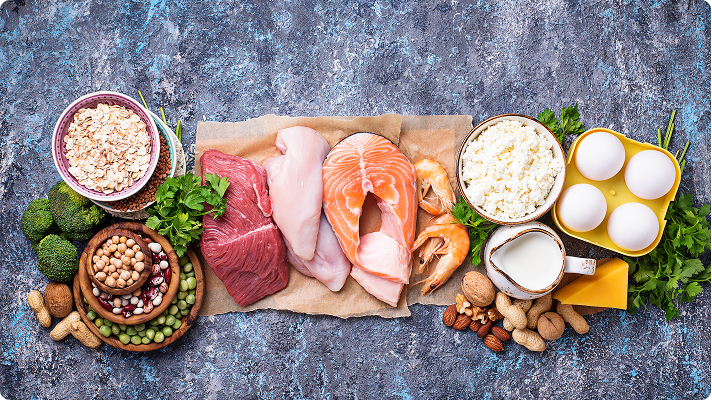
Better Balance
Approx. Weeks 6–10Your digestion and hunger hormones are better balanced. Cravings and the urge to eat should be reduced so it’s easier to make healthy, mindful choices. Stay consistent!
-

Activation Optimized
Approx. Weeks 10–14More noticeable changes start to happen as GLP-1 reaches more optimal levels. Your relationship with food improves and you’ll see changes in weight or body composition.
-

Live Activated
Approx. Weeks 15+Keep living activated to maintain GLP-1 levels to manage daily food challenges, maximize progress, and reach long-term weight management and wellness goals.
Make sure you stick to healthy lifestyle habits and allow at least 3 months of consistent, daily supplementation to reach optimal levels and experience more noticeable effects.
How the ingredient blends work
Using both blends together increase GLP-1 naturally and balance signals along the gut-brain axis.
Dual Activation
The GLP-1 Direct Activation Blend directly activates the GLP-1 production pathway within L-cells + the GLP-1 Indirect Activation Blend indirectly activates GLP-1 by optimizing the gut microbiome to create short-chain fatty acids and fuel production.
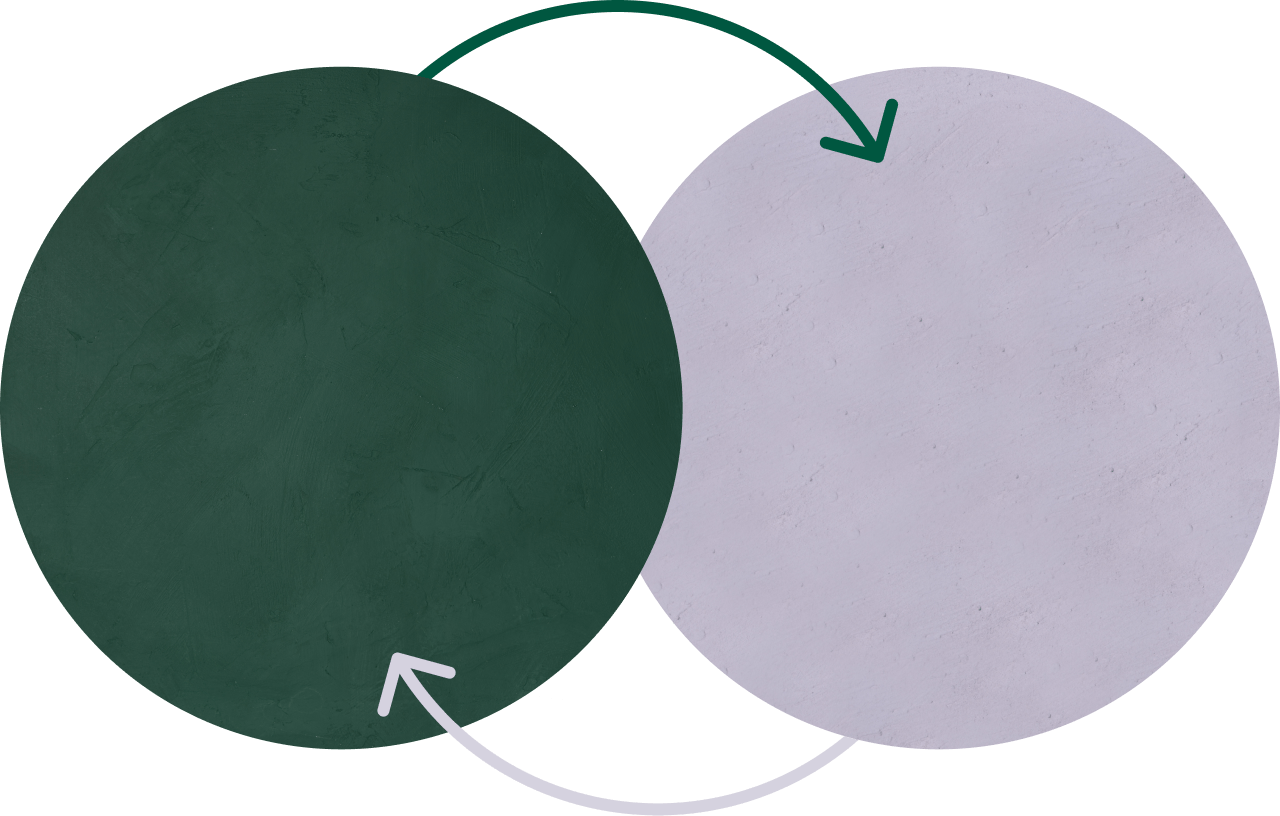
The ingredient blends amplify GLP-1 production by increasing GLP-1 receptors + decreasing the enzyme that breaks down GLP-1.
Dual Amplification
Synergistic Activity
When both ingredient blends are used together, they influence expression of GLP-1 and associated genes in L-cells.
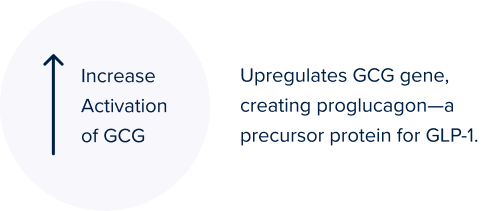
Increased GLP-1 production

Green fluorescence shows increased GLP-1 production in L-cells before and after using the GLP-1 Direct and Indirect Activation Blends.
Expression of genes that boost GLP-1 activity are also influenced by combined ingredient blends
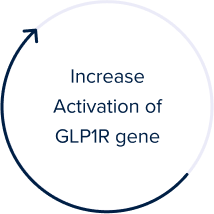
Increases GLP1R expression, promoting increased GLP-1 cell receptors
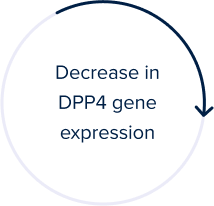
Reduces expression of DPP4, maintaining more active GLP-1 in the body

Stronger gut-brain signaling
Energy metabolism and appetite involve more than healthy digestion. The brain is also a key part of the process. Combining the GLP-1 Direct and Indirect Activation Blends upregulates neuropeptide genes, enhancing the strength and clarity of appetite-regulating signals along the gut-brain axis. This helps support psychological function to regulate mood and the urge to eat as it improves satiety, reduces cravings, and controls hunger.

Upregulates PYY and PPY genes, creating more neuropeptides that communicate along the gut-brain axis
